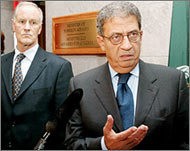Qatar raps Arabs for rejecting US plan
Qatari Foreign Minister Hamid bin Jassim bin Jabr al-Thani has reproached his Arab counterparts for rejecting a US initiative for reform in the Middle East before knowing what it contains.

“We must not reject something that we don’t know about,” Shaikh Hamid told a press conference on the sidelines of a meeting of Arab foreign ministers in Cairo.
The minister, whose country is a close US ally, asked why the Arabs “reject this initiative before knowing its tenor,” adding it was necessary to learn and study the details of it.
“If this initiative contains positive points, we have to be associated with that, and if it contains negative aspects, we have to specify which ones,” the minister said.
Arab ministers were to draft on Wednesday a joint initiative for Middle East political and economic reform, which would amount to a counter-proposal to Washington’s “Greater Middle East Initiative.”
Most of the Arab countries have rejected the US initiative amid fears foreign cultural models will be imposed on them and it omits any mention of the Palestinian-Israeli conflict.
Meanwhile, the head of the Arab League has said that unless the United States addresses Middle East conflicts and restores stability in Iraq, Arabs cannot support the “Greater Middle East Initiative” proposed by the Bush administration.
Agenda
Secretary-General Amr Musa was addressing Arab foreign ministers at the start of two days of meetings to debate an Arab response to the US plan and set an agenda for the 29-30 March Arab League summit in Tunisia.
 |
|
Musa (R) said Palestinian cause |
“As far as the Greater Middle East Initiative is concerned, it should not be confined to developing the societies but also to achieving stability in the region,” Musa said in his opening speech. “This stability cannot be achieved without a fair, correct and balanced treatment of the Palestinian cause and the Iraqi issue.”
The initiative, modelled on the 1975 Helsinki pact that the West used to press for greater freedom and human rights in the Soviet Union and eastern Europe, is aimed at the arc of countries extending from Morocco to Pakistan.
It would urge them to adopt major political and economic reforms and be held accountable on human rights, particularly women’s empowerment.
G8 summit
The Bush administration plans to present the plan at the G8 summit of industrial nations in June.
“As far as the Greater Middle East Initiative is concerned, it should not be confined to developing the societies but also to achieving stability in the region” |
However, several Arab governments – including Egypt and Saudi Arabia – have already rejected the US plan as an attempt to impose political reforms from abroad, and some have come up with their own proposals for Arab reform.
There is also a widely held perception that the initiative is already undermined by the US administration’s record in the Middle East.
Faced with the flat-out rejection of the plan from some of its closest allies, the US has said the plan is just a suggestion.
In Jordan on Wednesday, US Undersecretary of State for Political Affairs Marc Grossman said the best ideas for reform will come from the region.
“We recognise … the diversity of the region and that all countries are not the same and that all countries will come to their own understanding and their own plan,” Grossman said after meeting Jordanian Prime Minister Faisal al-Fayez.